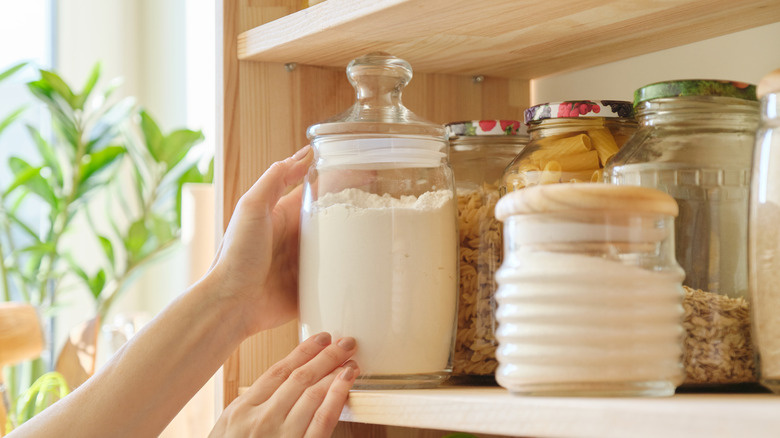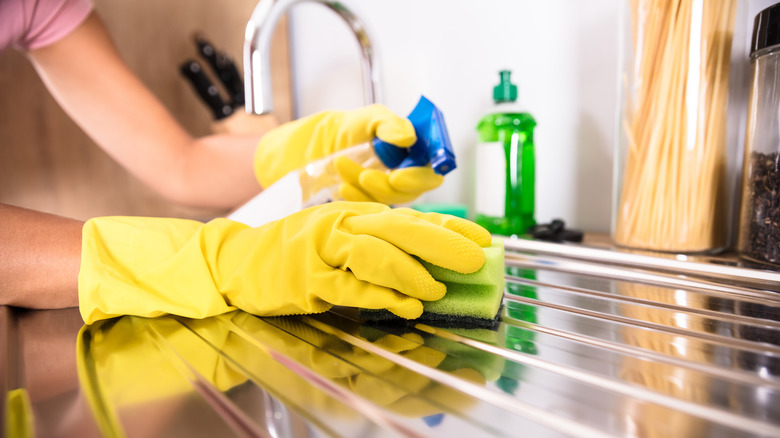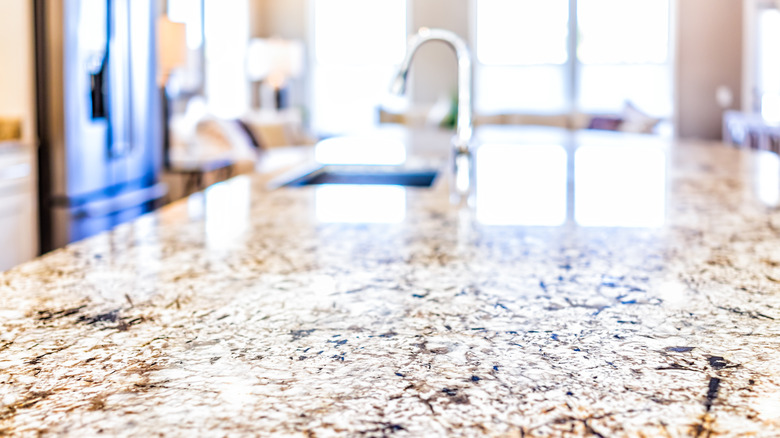Use Flour To Polish Your Stainless Steel Cookware And Thank Us Later
Flour is messy, make no mistake. If you've ever baked something and had to add flour, you'll notice that it leaves a thin white cloud of dust all across the surface of your countertop and utensils. It gets on your clothes bet they oven mitts or pants and it can be a bother to clean off. A little bit of mess is nothing new when working with flour and cleaning up a few flour trails here or there isn't anything to get worked up over. But chances are you've probably never associated flour with being a good cleaning agent, especially when it comes to stainless steel cookware.
To polish up your stainless steel utensils, whether they are forks, knives, or pans, first clean them with warm soapy water or your usual kitchen cleaner as you normally would. Dry the utensils as much as you can, making sure that they are as dry as possible before this next step. Sprinkle some flour onto a microfiber cloth and then begin to "buff," or rub the flour-covered cloth in a circular motion, across the surface of the cookware. Rub the cloth until the flour appears to "vanish" and you notice the steel begin to glimmer.
But hold on a second, how exactly can something that can be so messy as flour be a good polishing agent? Wouldn't it just stain the utensils? The answer lies within flour's ability to act as a natural abrasive.
Flour's abrasive ability removes dirt and grime
When you think of something abrasive, you probably think more along the lines of steel wool or the rough side of a sponge than the powdery white stuff you use to bake a cake with. While it is true flour isn't as abrasive as a soap pad or sponges, it does have a bit of abrasiveness to it that makes it good for cleaning up dirt, grime, or food residue. In a sense, flour is very similar to baking powder, another famed kitchen cleaning agent.
Flour's abrasiveness is actually very mild, such to the point that you won't even feel it if you rubbed it onto your hand. But it is abrasive enough that the grainy flour particles can get under and break down particularly tough pieces of grime or grease. Flour also has unique "absorption" abilities, being composed of starches and gluten. This means that, if the flour is spread across a wet or sticky surface such as oil in a pan, it turns the liquid into a thick paste that's much easier to clean up.
As you rub the flour across the surface over a washed and dried stainless steel pan, for example, you're not only breaking down any grease or burnt food stains but also collecting that lqiudy residue into a paste to be wiped off. This way, you're breaking down and absorbing any dried-on residue like sauces into one go.
You can also use flour to clean stone countertops
While flour may be useful for cleaning stainless steel appliances in your kitchen, you may be a bit confused as to why flour can clean something like granite or stone countertops. How could sprinkling a bit of flour on the stone clean it?
To clean a dirty stone countertop, simply mix together a paste of hydrogen peroxide and flour and spread it across the stained surface of the countertop. Allow this paste to sit on the countertop overnight before carefully using a plastic scraper. Although you may want to use sealant on any cracks in the countertop to prevent the paste from leaking in, the combination of hydrogen peroxide and the abrasiveness of flour works very well to remove the stains.
If you have copper surfaces, such as handles or faucets, that need to be cleaned, you can also mix a solution of flour, vinegar, and salt to spread onto the affected metal. After a few hours, you can wash and dry the handle or faucet and give it an optional polish if you so desire. This solution will gently clean the copper surfacing without wearing it down or scratching at it, as the abrasive solution will only clean off the grime and dirt instead of the metal itself.
In short, flour isn't just a versatile baking tool, but also a good cleaning agent. Just be sure to not make too much of a mess with the flour when you're cleaning.


